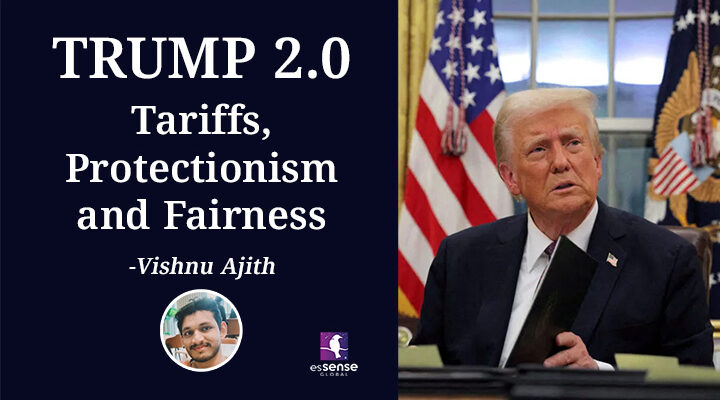With Trump 2.0, the U.S. has started imposing new tariffs on imports from various countries, including Mexico, Canada, and China. These tariffs, which Trump claims are aimed at protecting American workers and industries, have sparked significant debate.
Although most economists agree that imposing tariffs is detrimental to all countries involved, tariffs remain popular due to various non-economic arguments.
Recently, in the latest episodes of the Freedom Speaks Malayalam channel, we discussed both economic and non-economic arguments for tariffs and explained why imposing them is a bad idea. (The link to the discussion is provided below:
Some comments related to the discussion presented additional arguments in favor of tariffs that we did not address in the aforementioned videos.
Here are my responses to such arguments:
Argument:
“America imposing tariffs on Chinese goods is actually an essential thing for America. The Chinese government heavily subsidizes the manufacture and logistics of products made in China, thus giving Chinese manufacturers an unfair advantage. Tariffs are the only option Americans can use. Trump is using tariffs as a political tool to achieve things without resorting to war. He used it against Mexico and Canada like that. But with a government-regulated product market like China, don’t you think China has a very unfair advantage in keeping their production costs low?”
Response:
This is not unfair in any way. Even if China subsidizes its goods 100%, it wouldn’t be disadvantageous to U.S. citizens. Instead, it would be an added advantage for the U.S. (or any country importing goods subsidized by other governments).
Let me explain:
China provides subsidies to Chinese manufacturers, which means Chinese taxpayers must pay higher taxes to produce cheap goods. No U.S. citizen’s rights are violated here. When China sells subsidized goods to the U.S., American consumers get these products at lower prices, partly financed by Chinese taxpayers. This is not a problem—it’s an obvious advantage for U.S. consumers.
This implies that the more China subsidizes its goods, the greater the advantage U.S. consumers enjoy. The ones bearing the cost are Chinese taxpayers, which, from the U.S. perspective, isn’t a concern.
Now, what about U.S. producers? Isn’t it unfair to them?
No.
A basic fact to always keep in mind is that U.S. consumers are not obligated to purchase from U.S. producers. They have the right to buy from elsewhere when they get a better deal. This is actually a signal to U.S. producers to deploy their resources elsewhere in the economy where they are more valued by U.S. consumers.
If they cannot maintain their market share due to cheaper products from foreign countries, they have the freedom to compete by differentiating their products, improving quality, or reducing prices. If they are unable to do so, it simply means U.S. consumers don’t place much value on the goods or services produced by these U.S. producers.
Someone else providing goods or services at a cheaper rate doesn’t violate the rights of U.S. producers in any way. U.S. producers have no moral right to stop U.S. consumers from choosing a better alternative. Thus, there is no fairness in demanding protection from foreign competitors who provide goods or services more cheaply, regardless of whether those goods are subsidized. If they do demand such protection, they violate the rights of U.S. consumers to choose the best alternatives. That is what’s unfair to U.S. consumers.
Instead of investing more money in those goods or services, U.S. producers can simply shift their investments to other goods or services valued by consumers. This helps allocate resources efficiently and is a win-win for all parties involved. It benefits both U.S. producers and U.S. consumers.
Argument:
“When other countries impose tariffs on U.S. products, U.S. companies are unable to compete with domestic companies in those countries, which is unfair to the U.S.”
Response:
This argument effectively suggests that American consumers should be penalized because American producers are unable to sell goods elsewhere in the world. This cannot create a level playing field in any way.
These tariffs do not help American exporters or increase their exports. As seen from the responses of other countries, these tariffs only result in more retaliatory tariffs and worsen relationships with other nations.
Also, what is the rationale behind making U.S. consumers suffer in the name of a “level playing field” for U.S. exporters? What wrong did they do? In the name of fairness, such arguments only make life more difficult for American consumers.
To understand this better, consider the following scenarios from the U.S. perspective:
1. When other countries impose tariffs and the U.S. doesn’t:
Only American producers (exporters) suffer. (Consumers in other countries also suffer as their choices are limited, but let’s focus on the U.S. for now.)
2. When the U.S. imposes tariffs, but others don’t:
U.S. consumers suffer, but not U.S. producers.
3. When both the U.S. and other countries impose tariffs against each other:
Both U.S. consumers and U.S. producers suffer.
The argument in favor of tariffs effectively implies that the third alternative is better than the first, which is a completely ridiculous statement.
The major flaw in all such arguments in favor of tariffs is that they fail to recognize a simple fact: trade benefits both parties involved, not just the one receiving money.
![]()




